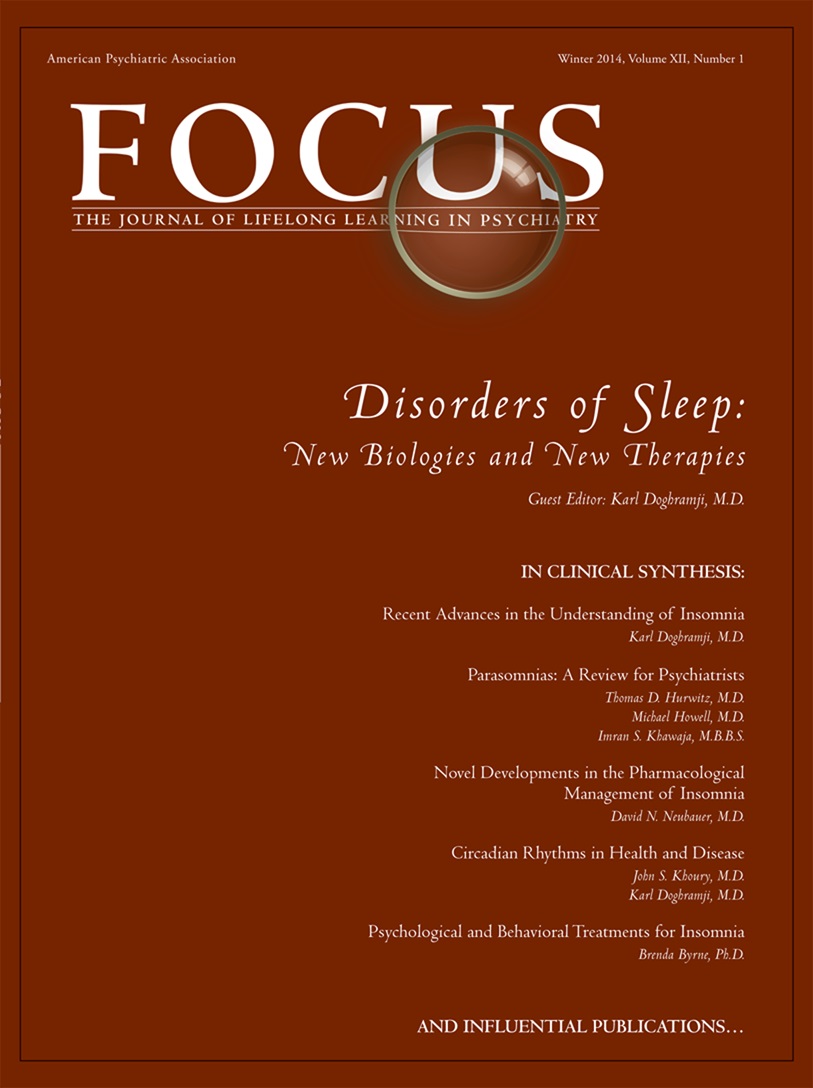Recent Advances in the Understanding of Insomnia
Abstract
Historical Perspective
Prevalence
Impact
Pathophysiology
Diagnosis
| A. Predominant complaint of dissatisfaction with sleep quantity or quality, associated with one (or more) of the following symptoms: |
|---|
| 1. Difficulty initiating sleep. (In children, this may manifest as difficulty initiating sleep without caregiver intervention.) |
| 2. Difficulty maintaining sleep, characterized by frequent awakenings or problems returning to sleep after awakenings. (In children, this may manifest as difficulty returning to sleep without caregiver intervention.) |
| 3. Early-morning awakening with inability to return to sleep. |
| B. The sleep disturbance causes clinically significant distress or impairment in social, occupational, educational, academic, behavioral, or other important areas of functioning. |
| C. The sleep difficulty occurs at least three nights per week. |
| D. The sleep difficulty is present for at least 3 months. |
| E. The sleep difficulty occurs despite adequate opportunity for sleep. |
| F. The insomnia is not better explained by and does not occur exclusively during the course of another sleep-wake disorder (e.g., narcolepsy, a breathing-related sleep disorder, a circadian rhythm sleep-wake disorder, a parasomnia). |
| G. The insomnia is not attributable to the physiological effects of a substance (e.g., a drug of abuse, a medication). |
| H. Coexisting mental disorders and medical conditions do not adequately explain the predominant complaint of insomnia. |
| Specify if: |
| • With non–sleep disorder mental comorbidity, including substance use disorders |
| • With other medical comorbidity |
| • With other sleep disorder |
| • Coding note: The code 780.52 (G47.00) applies to all three specifiers. Code also the relevant associated mental disorder, medical condition, or other sleep disorder immediately after the code for insomnia disorder in order to indicate the association. |
| Specify if: |
| • Episodic: Symptoms last at least 1 month but less than 3 months. |
| • Persistent: Symptoms last 3 months or longer. |
| • Recurrent: Two (or more) episodes within the space of 1 year. |
Evaluation
Conclusions
Footnote
References
Information & Authors
Information
Published In
History
Authors
Funding Information
Metrics & Citations
Metrics
Citations
Export Citations
If you have the appropriate software installed, you can download article citation data to the citation manager of your choice. Simply select your manager software from the list below and click Download.
For more information or tips please see 'Downloading to a citation manager' in the Help menu.
View Options
View options
PDF/EPUB
View PDF/EPUBGet Access
Login options
Already a subscriber? Access your subscription through your login credentials or your institution for full access to this article.
Personal login Institutional Login Open Athens loginNot a subscriber?
PsychiatryOnline subscription options offer access to the DSM-5-TR® library, books, journals, CME, and patient resources. This all-in-one virtual library provides psychiatrists and mental health professionals with key resources for diagnosis, treatment, research, and professional development.
Need more help? PsychiatryOnline Customer Service may be reached by emailing [email protected] or by calling 800-368-5777 (in the U.S.) or 703-907-7322 (outside the U.S.).

